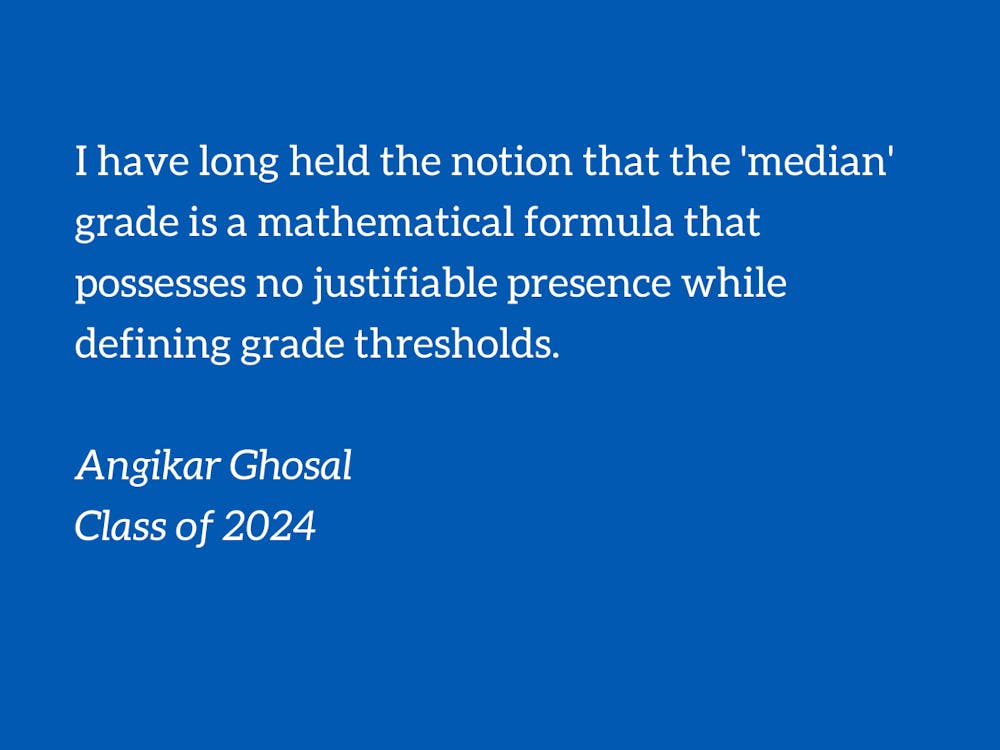As someone who did not go to high school in the United States, it quickly became apparent to me that there lies an intriguing peculiarity prevalent among both students and professors — the phenomenon of unwarranted and disproportionate attention being given to the 'mean' and the 'median' grades for quizzes, mid-term examinations or similar assessments. I have long held the notion that the 'median' grade is a mathematical formula that possesses no justifiable presence while defining grade thresholds.
A lot of courses at Duke — especially large, intro-level lecture classes — are characterized by a statistical 'curve,' the precise shape of which is contingent upon the mean and median scores. Courses graded on a curve are often too large in size to really adopt newer pedagogies and alternate grading systems that are only viable in small class settings — unless such courses lower academic standards. Note that peer institutions such as the Massachusetts Institute of Technology have long abolished grading on a curve.
One must recognize the inherent arbitrariness of requiring the accomplishments of students to conform to an arbitrarily chosen statistical distribution and fix the fraction of students that get an A or A-. Grading on a curve tends to impede collaborative efforts among students, as it removes any incentive for a student to aid their peers because doing so could render them at a strict disadvantage if they have already solved a given assignment.
This begets a culture where help received from teaching assistants is guarded like a rare Pokémon — beating the curve gets prioritized over the extent of learning.
Certainly, Duke courses tend to guarantee a minimum grade contingent upon some percentage threshold, such as 93% or above being an A in the Trinity College of Arts and Sciences. In theory, such a dictum may be efficacious. Nevertheless, many course assessments are specifically so designed that the predefined numeric thresholds for absolute grading prove impracticable owing to the difficulty of assignments, time constraints in examination settings. and so on.
There exists a simple remedy: We recalibrate the yardstick of assessment by positing the maximum score achieved in an examination as the new 100% and setting grades based on the new spectrum. For instance, someone getting 90% or more of the highest scorer’s grade should receive at a minimum an A-. Of course, analogous to the current system, the grade boundaries can be adjusted, and students in the left tails of curves could be bumped up.
A more salient concern lies in the absence of any compelling rationales warranting attention toward the average performance. It is a peculiarity of current grading systems that makes people unjustifiably preoccupied with the median scores.
There have been many occasions when I have not performed well. But should I ascertain the highest performance by another human, who is also a full-time student at Duke like me, I can precisely figure out how much I could potentially improve. It is more worthwhile to pursue zeniths that are already tangible realities, already embodied by other students at Duke than purely theoretical possibilities.
If the current grading system did not emphasize the median score, what compelling imperative is there for anyone to be satisfied (or dissatisfied) with the fact that their own performance is “five points above the median?” No sprinter has ever juxtaposed their prowess against the “average” participant in all NCAA tournaments combined. There is a reason why athletic prowess is measured in terms of negative deviation from the peak performance.
Sure, even if someone has zero chance of being as good as Usain Bolt or Kelvin Kiptum, it is worthwhile indeed to know how much one relatively lags behind the paragon of excellence. The two reasons to even dream of climbing Mount Everest are, firstly, it exists to be climbed, and, secondly, it has been climbed before and conquered before.
There are innumerable areas where I discern myself to be insufficiently talented to make any mark, but I strive to know what the extent of the gaps are and which gaps merit the expenditure of time and effort for partial amelioration.
Duke is an elite school, yet most coveted achievements have scant regard for Duke's median. If you want to get admitted to your favorite law school or earn your favorite scholarship to study in the United Kingdom, you must harbor no illusions: Not only are they indifferent towards the median, but they are also steadfastly fixed on finding the foremost and resplendent. Even if Duke is a top-ranked undergraduate school, Harvard Medical School is still competitive. The knowledge of beating the average in organic chemistry at Duke neither tangibly enhances your prospects nor offers a rational basis for emotional solace.
Of course, metrics for brilliance vary widely across disparate domains of knowledge, and I too often lament my absence of certain talents. Diversity of skillsets across domains does not proffer rationale for complacency. Duke should avoid creating scenarios where one’s happiness is merely a perverse elation from surpassing one’s dorm neighbors and roommates of past romantic partners, and that means grading reform — especially in large intro-level classes which tends to pit student against student, friend against friend. This can be achieved without diluting academic quality and rigor — all that I am asking for is to prevent unnecessary antagonistic competition between students.
One’s true competition should be with oneself. The implementation of an evaluative schema that abolishes the concept of grading on a curve and instead uses absolute grading scaled in accordance with the highest scores engenders a scenario wherein the reaction to achieving a 94% shall be the same, whether or not the scaled average is a 67% or 97%. In that utopian realm of learning, one's solitary rival is none other than oneself, and the sole endeavor lies in motivating personal improvement.
Angikar Ghosal is a Trinity senior. His column typically runs on alternating Mondays.
Get The Chronicle straight to your inbox
Signup for our weekly newsletter. Cancel at any time.

